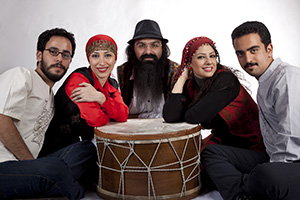What does it take to keep world music alive? Mallika Naguran checks in with world musicians at the Penang World Music Festival 2013 from Iran, Portugal, Brazil, Bali, Malaysia and Latin America, just to list a few, to find out.
Penang, 30 March 2013. These musicians look cool but little do people know, they carry a heavy burden. Playing world music, a genre of music that does not hit the top of the charts as often as rock or pops does. As such, it is not exactly easy when it comes to taking world music to professional levels. At the , musicians from around the world revealed today at a press conference that world music is often the cross that they have to bear to keep traditions alive.

Michel Bastrin from Inka Marka lives and breathes Andean tradition at the Penang World Music Festival 2013. Photo by Mallika Naguran.
Playing Andean music at this two-day workshop cum concert show is Inka Marka, which features a distinct pre-Columbian dance based musical form. “We try to express the traditions of two different tribes, the Quechua and Aymara, and the musical forms that are present in the current day folklore of Latin America. That’s our musical journey to preserve and develop South American music,” says Michel Bastrin (pictured).
The South American group has even rescued old materials in the course of their recording of 12 albums thus far. “We’re not rockstars. We live and breathe our music. Sometimes it is difficult as the popularity of our music is not high. World music festivals are great as they help us keep our roots alive. Workshops held at these festivals help people reconnect with their ancestry,” he said.
Hailing from Brazil, Jailton Macedo (aka Dende) the leader of the band Dende & Band who now lives in New York, shared about the kind of music they played when he was a kid living in Bahia. “My family used to dance and we played for the Gods until two am in the morning. But things have changed since then.” Dende finds it sad that the traditional folk music is being challenged and that ironically they are in a position to represent their culture outside of their country due to pervasive mainstream music. “When I was young, we sang and lived our religion – the Candomble – and we believe in the power of nature, ocean, and wind. Now people go to Brazil to samba!”
But things are slowly changing as more people, even young ones, are becoming more appreciative of their roots. Dende & Band’s second album Back to Bahia captures traditional values of the old hometown he once knew, in particular an old man who has steadfastly worked in the café, who he calls, the Café Man. The album was recorded in Brazil. “Now people back home like Bahia are more respectful of us.” Dende now makes musical instruments from recycled materials.

Nasout fights misrepresentations of Iran through world music performed at Penang World Music Festival 2013.
The instruments Dende & Band play include pandeiro the tambourine; timbalada, a drum; timbau, a hand drum; ago go, a hand bell, and surdo, a base drum.
For the band Nasout from Iran, music is about reconnecting with the past – a very rich past, which has been clouded by recent political events. “Our culture is misunderstood and misrepresented by the press. This is our chance to show the world what we are. We were formerly from Persia with 5,000 years of history, we’ve lots of beautiful music, that we wish to share these to negate all those (wrong) impressions.”
Being a world music proponent is not easy as well, as Nasout reveals. “We have to look for the special instruments, get training in those, then look for gigs to perform. World music is hard to enter but that’s the decision we had to take to keep our traditions alive.”
The Penang World Music Festival 2013 will take place on 30 March (Saturday) and 31 March 2013 (Sunday) at the Quarry Park within the lush greens of the Penang Botanic Gardens.
Read related article on Penang World Music Festival 2013 artiste line-up.
Photography of Inka Marka by Mallika Naguran.
Tickets
One day: RM80 for adult and RM30 per day for a child between five and 12 years old.
Two days: RM140 for adult and RM70 for a child.
Tickets can be purchased online at www.ticketxpress.com.my or at selected hotels.